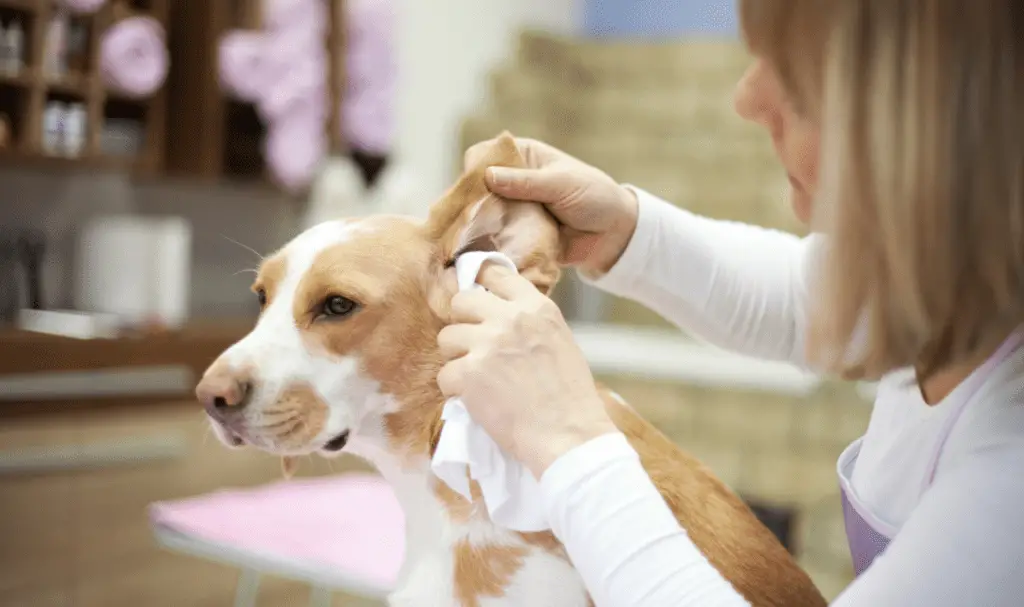
It’s normal for your dog to scratch its ears a few times every day. This could be due to minor irritation or an insect bite, just like with humans. However, if it gets more frequent than that or becomes excessive, that’s a bad sign.
Why Does My Dog Scratch Its Ear?
Dogs might scratch their ears excessively due to infections like bacteria, mites, yeasts, or fungi, or as a result of allergies, a cut or injury, a foreign object in the ear, or too much ear wax.
Every dog owner needs to understand the implications of excessively itchy ears in dogs. What is equally important is knowing how to treat the problem when it arises.
There are several ways to maintain your dog’s ears’ health; however, prevention is a much cheaper way to go.
By helping your dog maintain proper hygiene and keeping it from harm’s way, the frequency of itchy ears can be drastically reduced or minimized. This way, you can avoid having to take your canine to the vet every other day and having to spend money on recurring appointments.
However, if you cannot prevent it, a trip to the vet’s office is the safest way to deal with this problem.
The earlier infections are detected and treated, the faster your dog will recover, the less money you will need to spend, and the less the possibility of fatality.
Your vet will use your dog’s medical information and history to determine how to proceed with the treatment. Treatment will involve cleaning your dog’s ears, prescribing drugs to combat inflammation and bacterial infection, and in severe cases, surgery may be required.
Bacteria
A bacterial infection could be one of the reasons why your dog doesn’t seem to get any rest from itching. A large number of extreme itching cases in dogs stem from bacterial infection.
The danger of bacterial infection is its destructive nature. If not treated promptly and comprehensively, a bacterial infection can cause a dog to die.
Canines are exposed to bacterial infections mostly during times spent outdoors and when there is too much moisture in the ear.

How Do Bacteria Cause Infections In dogs?
Dogs are exposed to bacteria every day. How your dog is impacted by it depends mainly on the frequency of attacks and, more importantly, your dog’s immune system.
Some dogs have a more robust immune system than others. They can resist bacterial attacks and show little or no signs of illness, while others do not. It is the same with itching.
The primary cause of bacterial infections in dogs is exposure to contaminated water. An environment where unclean water collects in pools, ponds, or containers is likely to cause bacterial infection.
A dog’s ears form a sort of L-shape, and so retain a lot of fluid. This retained fluid acts as a breeding ground where bacteria can begin to develop. Other causes are; contact with urine and feces and consumption of meat that hasn’t been well cooked.
When bacteria get into the dog’s ears, apart from the itches, you may also notice redness in the ears, inflammation in the inner, middle, or outer ear, a collection of wax, and offensive odor.
Treatment of Bacterial Infections in Dogs’ Ears
If you begin to see the signs of a bacterial infection, especially excessive itching, take your dog to the vet as soon as possible. Do not be tempted to treat the infection at home.
Prevention of bacterial Infections in Dogs’ Ears
Since we have identified moisture as the primary source of bacterial infections in dogs’ ears, we can prevent moisture from being retained in their ears by constantly drying them.
Simple practices will ensure that moisture doesn’t pose a problem to your dog’s health. Wiping your dog’s ears after bathing it or after a fun time at the pool is one such practice.
If your dog is a Cocker Spaniel or Basset Hound, you should take ear cleaning more seriously. These dog breeds have ear types that exhibit the highest moisture retention rate.
If your dog flinches while you attempt to clean his ear, it most likely means that your dog has a sore in its ears. You will need to approach the cleaning with more gentleness and as slowly as possible. In this situation, it is suggested that you begin first by rubbing around the ears as you slowly work towards the point of interest.
There are right and wrong/safe and unsafe ways to clean a dog’s ears. Do not use towels in your dog s ears, and cotton swabs must be limited to the external ears.
So, how should your dog’s ears be cleaned?
Get your cleaning agents and the other cleaning tools ready. These should include small round-edged scissors and pieces of cotton.
Just any cleaning agent won’t do. Veterinary-approved cleaning solutions are safer than homemade ones, which sometimes contain chemicals that are hostile to dogs’ skin. To be on the safe side, ask your vet to recommend appropriate cleaning solutions for you.
Follow these cleaning steps:
- Fill your dog’s ear canal with a few squeezes of the cleaning solution.
- Rub the base and around the ears gently while the solution does its job.
- Use the scissors to hold a piece of cotton and clean the ears without going deep.
Ear Mites
Ear mites are tiny parasites that love to make the ears of dogs their home. Their main goal is to find food, and that’s what ear wax, oil, dirt, and other materials present in the ears are to them. They clean up our dogs’ ears.
Now, this would have been a perfect and mutually beneficial arrangement except that your dog eventually begins to experience extreme irritation and discomfort. The activities of ear mites may not be fatal or harmful, but you probably would prefer for your dog to be undisturbed and alert. Constantly scratching his ears is a huge distraction, especially for a guard dog.
Ear mites are contracted from the surroundings. When your dog passes through vegetation, these mites can attach to your dog’s body as it brushes past.
Ear mites are contagious from dog to dog and spread to humans through very close contact. Some dogs are more susceptible to ear mites than others, and puppies especially have a high rate of ear mite infection than mature dogs.
How Do I Know If My Dog Has Ear Mites?
There is no need to try to peer into your dog’s ears to know if there are mites or not, except you want to do so out of curiosity. These parasites are microscopic; they are so small that they are not easy to spot.
You can know from the signs below if there are ear mites in your dog’s ears without having to see them:
- Vigorous shaking of the head
- Intense scratching of the ears
- Red and painful sores around the ears which result from the scratching
How to Treat Ear Mites in Dogs
The best course of action to take when you discover ear mites is to take your dog to the vet. Your vet will prescribe the appropriate medication required.
Don’t be worried if the treatment lasts for up to two months or even more. Ear mites aren’t easy to get rid of, and the goal is to get rid of all of them.
The adults are more accessible to kill than the newer ones, and they reproduce even while treatment is in progress.
How to Prevent Ear Mite Infections In Dogs
As has been earlier established, prevention is a much better approach to the infectious outbreak than treatment.
Mites stay on surfaces like beddings and furniture in the home, and these are the best places to attack them. Making sure that the surfaces in your home are well disinfected from time to time as you clean up will kill the mites and forestall their build-up.
Cleaning your dog’s ears periodically will ensure that mites do not have enough time to lodge in their ears.
Foreign Objects in the Ear of My Dog
It’s almost certain that your dog will get foreign objects in its ears at one time or the other. Grass seeds are the most common foreign objects that could get in your dog’s ears. More problematic is the discomfort they cause to the ears of your dog.
Foreign objects in the ear of your dog give signals such as:
- Inflammation of the ears and around it
- Intense scratching of the ears
- Vigorous head-shaking
Cuts or Injury
Dogs can get cuts or injuries while they play, and these injuries could happen around their ears. These cuts vary in size, and the smaller they are, the more difficult they are to spot. Excessive itching and scratching of the ears could be the only signal we get of these injuries.
Your dog may not be rubbing its paws to target the injured area. Instead, it’s most likely trying to get rid of the flies that have been attracted to the cut.
Once noticed, cuts and injuries should be promptly addressed to prevent them from becoming a bigger and more expensive problem.
Fungi
Fungal infections in dogs are not as common as bacterial infections, but they could be equally as dangerous when they occur. Fungal infections are one of the possible reasons why your dog’s paws are always close to its ears.
Causes of fungal infection in dogs
There are several causes of fungal infections in dogs. These include the following:
- Infected environment
- Contact with infected animals
- Yeast growing on dog’s body
Types of Fungal Infections in Dogs
Fungal infections in dogs can be divided into two major types:
o Internal fungal infections: this affects the internal body organs and causes internal sicknesses.
o External fungal infections: this affects the outer part of the body, especially the skin.
External fungal infections are responsible for excessive scratching of the ears in dogs. Some examples of this fungal infection are:
- Roundworm is caused by direct contact with an infected person, animal, or object around the house or surroundings. This results in excessive itching on the body, including the ears. You can minimize or prevent a ringworm infection by keeping the environment clean and disinfected.
- Yeast infection is called fungal dermatitis and is a skin condition caused by the rapid growth of yeast found in a dog’s body. When this yeast grows massively, it attacks the skin and causes itching in various parts of the dog’s body, including the ears. This then causes your dog to continuously and excessively scratch its ears.
Allergies
Allergies could be the reason why your dog scratches his ears more than usual. Dogs can be allergic to a wide range of food and materials. If you are observant, you can easily spot these allergies and contain them.
You can easily detect and handle food allergies if you introduce new food slowly to your dog when it comes to food allergies. This way, any possible allergies will be noticed without having to put your dog through a painful experience.

Frequently Asked Questions
Question: How can I help my dog with itchy ears?
Answer: some medications can relieve the pain or itch and ultimately remedy the cause of itchy ears in dogs. More importantly, the good news is that these remedies are safe for the health of your dog. Examples are diluted vinegar or apple cider, hydrocortisone ointment, and antihistamines.
However, to ensure that your dog gets the very best of care, visiting the vet remains the best thing to do.
Question: Why does my dog keep itching his ears?
Answer: there are a host of reasons why your dog might be rubbing its ears with its paws incessantly. These range from the minor ones like a small sore or cut and dirt that was picked up while playing to the significant causes like bacteria, fungi/yeast, mites, and allergies.
Question: Can bacterial infections in dogs be contagious?
Answer: Yes! Bacterial infections in dogs are contagious. They are spread to humans through contact with their feces, dander, or saliva. Children are at a higher risk of contracting bacterial infections from dogs because their immune systems are still being developed. This is why bacterial infections should be taken care of as soon as they are noticed.
Question: Can I get an infection from a dog licking me?
Answer: Yes, but in very rare cases. Being infected after being licked by a dog has proven to be a possible but rare occurrence. Some of these rare cases have been fatal.
Question: My dog has a cut on his ear; what do I do?
Answer: If you notice a cut or wound on your dog’s ear, the safest and wisest decision would be to visit a vet. This is because cuts and wounds that are small may be more serious than they appear.
However, if bleeding is noticed, you don’t have to wait for a vet to stop it. Use a clean cloth or a piece of cotton to apply pressure on the cut till the bleeding stops. Then, bandage the wound.
Question: Can humans catch ear mites from dogs?
Answer: Yes! Although in rare cases. There have been recorded cases of ear mites being transmitted to humans from dogs. This is another reason why we must protect our health by protecting our dog’s health.

Conclusion
Dogs go through a lot of discomforts\ whenever they have an itch on their ears. Scratching them with their paws is the best they can do, but this brings little or no relief. The paws are usually too big to be of any help.
You will have to be vigilant enough to observe excessive itching of your dog’s ears and take the necessary steps towards ending its misery.
Prevention is the best and most efficient plan. You can stop these itches before they happen by ensuring proper hygiene for your dog and keeping its environment clean.
People Also Read
Great Dane & Dalmatian Mix Breed Guide!

